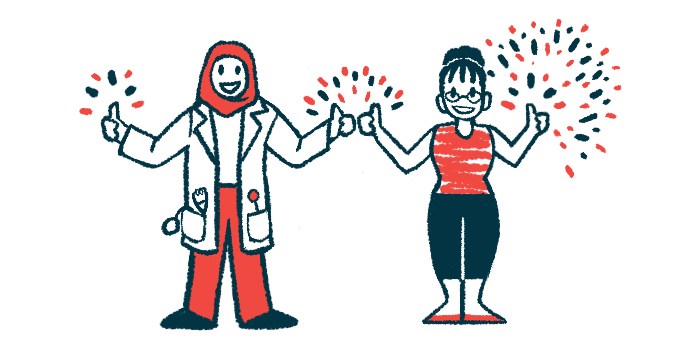Soliris approved for children, ages 6-17, with generalized MG in EU
European Commission favors targeted therapy for young refractory patients
Written by |

The approval of Soliris (eculizumab) in the European Union now extends to children and adolescents, ages 6 to 17, with generalized myasthenia gravis (gMG).
The European Commission decision covers Soliris’ use in children who have refractory disease, meaning they have failed to respond to standard treatments, and are positive for antibodies against the acetylcholine receptor (AChR), the most common type of MG-causing antibody.
This approval extension makes Soliris the first targeted therapy approved for pediatric gMG patients in the EU, according to the therapy’s marketer, AstraZeneca.
Soliris treats myasthenia gravis by blocking part of the complement cascade
“The impact of gMG on children can be devastating, and families have long been awaiting solutions. This approval of our first-in-class C5 inhibitor Soliris for paediatric patients with refractory gMG in the EU exemplifies our efforts to deliver transformative medicines … for rare disease communities,” Marc Dunoyer, CEO of Soliris’ original developer Alexion (now a subsidiary of AstraZeneca), said in a company press release.
“Soliris offers hope for improved outcomes for children and adolescents impacted by gMG and we are committed to increasing access for these families as quickly as possible,” Dunoyer said.
Soliris is administered via an infusion into the bloodstream (intravenous infusion) given every other week after an initial loading period of five doses. It works to block the activity of C5, a key component of the complement cascade — part of the immune system whose activity plays a key role in driving MG.
The therapy was approved in Europe to treat adults with refractory, AChR-positive gMG in 2017. Similar approvals have also been granted to Soliris in the U.S., Japan, and China.
The recent EU extension to include children and adolescents comes a month after a positive recommendation from the Committee for Medicinal Products for Human Use, a part of the European Medicines Agency.
The approval was based on data from an open-label Phase 3 clinical trial (NCT03759366) in which 11 children, ages 6 to 17, with refractory and AChR-positive gMG were treated with Soliris for 26 weeks, or about six months.
Results showed that average scores on the Quantitative MG (QMG) scale, a physician-rated assessment of MG severity, improved by 5.8 points after six months, suggesting less severe disease symptoms.
The therapy’s overall efficacy and safety in these young patients was comparable to earlier trials testing Soliris in adults; the most frequently reported side effects were headache and the common cold.
“Soliris showed clinical benefit and sustained improvements in disease severity through 26 weeks in a Phase III trial, offering potential to improve quality of life and redefine disease management for children and adolescents living with this rare neurological disease,” said John F. Brandsema, MD, a primary trial investigator at the Children’s Hospital of Philadelphia.
Brandsema added that its approval in Europe “represents a significant advance in care for paediatric patients with refractory gMG, who previously had no targeted treatment options to help manage their condition.”
AstraZeneca is working on applications requesting the approval of Soliris for children with gMG in other countries.







Leave a comment
Fill in the required fields to post. Your email address will not be published.